Evolution of Jane Eyre: The Musical Part Five- Broadway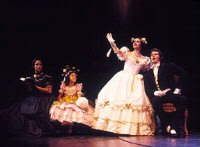
We have seen the musical through its demo stage, previews in Witchita, productions in Toronto and La Jolla, and now we're at the end of the professional run. I meant to upload some clips from footage I have but my computer will not co-coperate. So, here are some stills instead.
Previously the show was not accepted because it was too faithful to the novel. This time around, it was not accepted because it was not faithful enough. It might anger a purist, but honestly, if adapting a novel for television is difficult the stage must be far more demanding, and it is. But the show does succeed in what it wishes to do. This is not a traditional rendering of the book, it is a dreamscape. This version puts the audience into Jane's mind as she thinks back over the events as she writes her memoir. Jane is always present, but there is no fixed set whatsoever. A church is constructed by fragments- windows, light pouring into them and casting their colours on the floor, objects fly in and out of view as scenes change and as Jane comes to new memories.
Some changes do not seem to have a purpose, however. The most glaring example is the rearrangement of scenes in the second act. The Gypsy scene occurs well after Mr Mason's accident and is followed directly by the proposal. Mr Rochester barely puts down his bonnet and takes off his skirt before he asks Jane to take a stroll with him in the garden. When Jane leaves him she stumbles across the moors to- Gateshead, where St.John Rivers is tending her aunt. Which brings me to the next point: changes to character. The previous versions had some excellent character development. This St.John is a nice guy, a little silly perhaps but alright. Blanche is also just a little silly, not very bright but she means well. I can't see why this change was brought about when these characters had been so well drawn in the previous versions!
Probably the most interesting facet of this particular version, for me, is Bertha. Seeing this version on film has left me with a lot of questions. Firstly, Bertha's first appearance is in Jane's bedroom. She reaches over and sees a sketch Jane has been drawing of Mr Rochester. Throwing it from her, she darts out of the room, through a passage and into Rochester's room where she sets the blaze. Throughout the show she is wearing a long Victorian wedding dress complete with veil (I think she loses the veil at the end...). Jane's connection with Bertha is considerably played down compared with the La Jolla production, but there are still some interesting points of contact. For example, the scene after the wedding.
I really like the staging of this scene. Because of the dream like quality of the setting we can go directly from the church to the attic. Rochester invites everyone to see his 'lovely wife!' and instantaneously the audience is plunged into the darkness of the attic- from the point of view of those within it. In the fleeting light of the windows we can see a shape moving, and sobbing. The wedding party enter to face us and Bertha. She is dragging a book around with her, and as Rochester encourages us to sympathise with her she seems frustrated by something in the book, or perhaps she cannot read it. She rocks back and forth, holding her fists to her head as she looks over it, then takes it to Grace Poole. Soon afterwards she recognises Rochester and attacks him- but, really, she barely touches him before she is restrained. In this particular performance I thought Rochester looked cruel in his treatment of Bertha. While he narrates his past for everyone, he runs his hand along Bertha's face. She seems to lean towards it, and when he moves off she looks stricken. At some point her bonds are released. Jane notices a rag doll- like the rag doll she had in previous versions- lying on the floor. She takes it to Bertha. The two- both in their wedding clothes- curtsy to eachother before Bertha leaves with Grace.
From here you can watch: The Proposal, Sirens and Farewell Good Angel, Secret Soul being recorded in the studio.
These are just a few of the things hidden away in the Bronteana archives:
Article on the show's innovations in stage lighting, Neofitou's costuming, interviews with Anthony Crivello and James Barbour on playing Mr Rochester (part of a larger series). Footage from the La Jolla performance comes to light, 'Vision, Flame, and Flight: Adapting Jane Eyre' by John Caird, and 'Jane's Journey' a series of interviews with all of the major cast members from the Broadway run, as well as John Caird and composer Paul Gordon- in 6 parts: one, three, four, five, six. (I can't find the link to four). And, finally:the highlights CD of the Broadway cast can be purchased from Amazon.com here.
ETA: The promised stills: ('Does my forehead not please you?' And at bottom, Mr Rochester does a little dance in his gypsy skirt for Jane's amusement)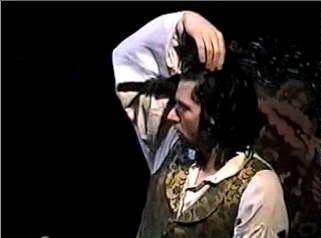
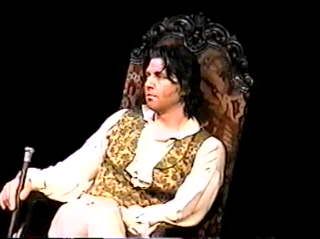
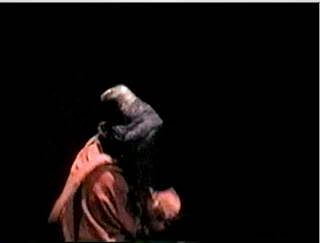
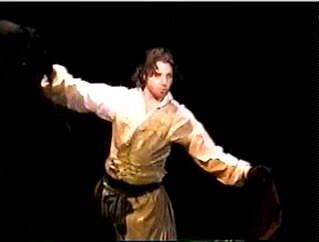







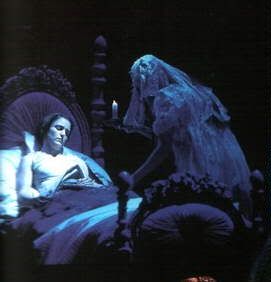

4 comments:
What do you thing Bertha's carrying a book could mean? Is it supposed to relate to Jane in some way? Or are they saying that she was literate and unfairly trapped?
There are a lot of possibilities here because books feature prominently in the production. It is also unclear if Bertha was disturbed by what she read or if she could not read it at all. It would tie, for example, with Bewick's. The Red Room is replaced with the attics at Gateshead (but Jane goes there voluntarily in order to read in peace. John Reed tears the book and she is left in the attic (although they don't say she is locked away as in the Red Room...)
Another possibility is that the book may be Paradise Lost. The work is quoted several times in the course of the show. Especially the passage about Adam and Eve walking through Eden. Jane and Helen read that passage together, and St.John reads it to her on the moors. When Jane finishes the passage for him he remarks: 'you know it well!' And she quips: 'Oh, I'm an expert at Paradise Lost...'
Although it is not unlikely that it is also tied to 'Sweet Liberty' in which Jane encourages several school girls to 'engage their minds and souls' but reading is not particularly mentioned...
I saw this in Blackpool and was very disappointed. I liked the portrayal of Bertha, but I was upset by the transformation of Mrs Fairfax into a figure of fun, a silly old woman providing some humour. I didn't think it was necessary.
I am a purist who likes any version of a classic to be faithful to the book, so whilst I understand the comments on the difficulty in staging this, for me I did not enjoy the changes which were made.
I am not entirely sure, having seen this, that Jane Eyre is suitable for turning into a musical.
Lynne
to Lynne,
Did you want to send along a review for my blog?
I agree that Mrs. Fairfax doesn't need to be a comic character. She always had patter songs but in the earlier versions she also sets the tone of mystery at Thornfield which is completely absent from her character in the later versions. The show had been criticised for being too dark and depressing, so they started trying to make things more and more comical (which resulted in some really poor choices very late... You can see some of this in The Proposal clip where the audience bursts out laughing when Jane accepts Rochester because of the timing and the way she says 'yes, sir').
From what I hear, I think this last version only works on the big stage with its big effects, otherwise it will look disjointed.
I think JE has all the right materials for a musical (strong emotions are the only real basis for characters breaking into song).
I think the truth is that on Broadway they don't want to see a traditional rendering of a novel- they want spectacle and speed- and humor (after all the musical that was all the rage at the time was The Producers). I firmly believe that the show should be rewritten to include much of what was cut from its Toronto and La Jolla versions.
Post a Comment